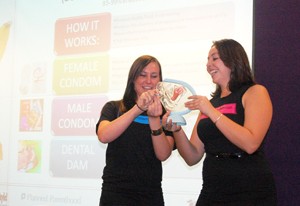You paid for dinner, you lit the candles, you put on the music – but did you bring a condom?
Sex Ed: College Style, put on by the Associated Students of the University of Arizona Women’s Resource Center, Campus Health and Planned Parenthood of Arizona, was presented last night to help educate students about safe sex.
“”I think at this specific college campus, one of the biggest problems that we have is just a lack of (sexual) education that exists,”” said Jai Smith, an undeclared sophomore and a health and sexuality intern with the Women’s Resource Center.
“”Because Arizona is an abstinence-only state, there are individuals that are coming from in-state and not knowing a lot of information about what is available, whether it be female condoms or any other kind of protection that is available. People just don’t know it is out there.””
In order for people to feel comfortable and safe when they are having sex, Smith said that it is necessary to know about all types of protection so that people can have the fun without negative repercussions.
“”I’m hoping that people take out of this the importance of sexual health and … the different methods that are available to them, both hormonal methods as well as barrier methods,”” Smith said.
Alyssa Padilla, a marketing senior and the senior health and sexuality intern, said that there is so much more to sex than just the actual act.
“”I hope that people will see that having sex isn’t the only thing about sexuality,”” Padilla said. “”Sex is a bigger thing which includes not only responsibility and emotions behind it but also protecting themselves.””
Since Arizona is an abstinence-only state, Padilla said that it is extremely important to educate college students.
“”More than half of the UA campus is sexually active,”” Padilla said. “”Some of them are coming from a well-educated sexual health background, and some of them aren’t coming from anything – they’re just coming from what they learn from their friends. It’s very important to kind of pick up the pieces, and that’s why we brought this program.””
Adriana Amaya, a psychology senior, said that even if people are not having sex they should still know about sex, in case the situation presents itself.
“”I think it is really great that they have this program,”” Amaya said. “”Awareness, I think, is great for people our age that either are having sex or they are not. They should know about it.””
Deanna Lewis of Planned Parenthood of Arizona said that many people do not know their sexual rights and often make some simple mistakes.
“”I think what this is able to do is raise awareness of issues like … consent and coercion,”” Lewis said. “”How to protect yourself from sexually transmitted infections is a huge issue and how to prevent unintended pregnancies is also a huge issue.””
Padilla said that it is essential to combine the emotional and physical aspects of sex in order to maintain a healthy lifestyle.
“”This is a physical thing intact with an emotional thing and it all has to do with responsibility and education and knowing everything,”” Padilla said. “”Just because you’re educated (about sex) doesn’t mean you have to be sexually active.””
Sexually transmitted diseases are on the rise and it is up to sexual education programs to help control those numbers, Lewis said.
“”When you look at what’s going on in terms of the Center for Disease Control and information about how sexually transmitted infections are on the rise, awareness can provide education,”” Padilla said. “”The intent is to decrease (sexually transmitted infections) so hypothetically you can have none of that going on.””
Overall the goal is to get sex education to become a standard in the state of Arizona, she said.
“”Comprehensive sex education isn’t illegal here in Arizona,”” Padilla said. “”It is just frowned upon, so I want to use the fact that it is legal to get in into every school in Arizona.””









